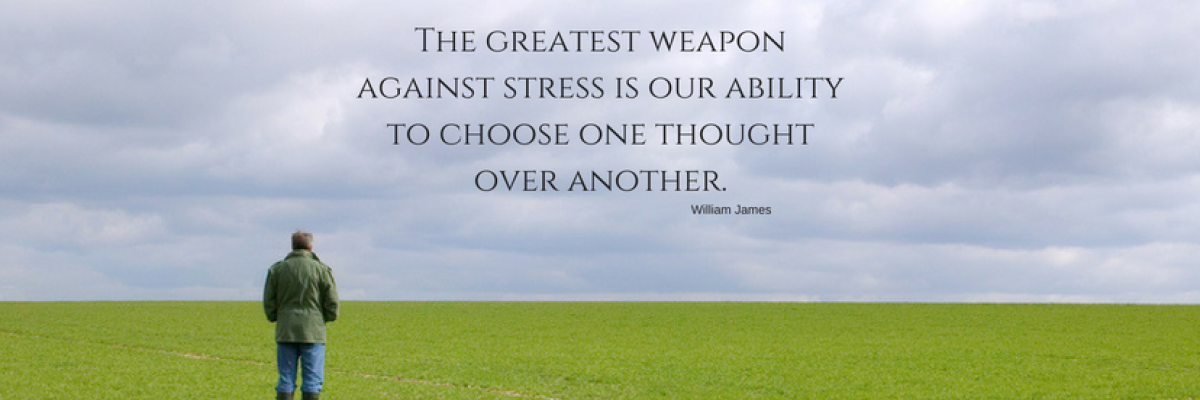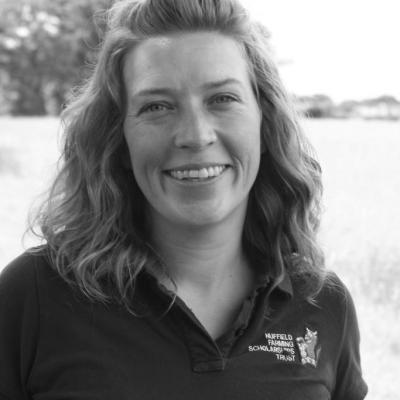
The greatest weapon against stress is the ability to control our thoughts
12 September 2019
When I first met psychologist Willie Horton during my Nuffield scholarship, he professed that you could learn to achieve your goals - effortlessly! It was a big and bold statement and at that time I didn’t believe him and couldn’t believe him...because my belief was that to achieve anything worthwhile in life, it took effort - which inherently involved a degree of stress. But the results he had achieved working with CEOs of large multi nationals seemed so impressive that I was keen to understand more and explore his research further.
The first step in stress management is learning what stress is and how it arises. When you understand the damage that stress does to the physical body and your mental state - it is quite a motivation to learn how to reduce it and if possible - eliminate it all together! I’m not talking about serious stress either, I’m talking about low-level stress that we experience everyday - the thing that the World Health Organisation states will be the biggest killer in the Western world in the 21st century.
In evolutionary terms, the stress response developed to save our lives - the fight or flight response to a startling situation meant that our body geared up physically to be able to stand and fight the situation or quickly run away. The immune system and digestive system in our bodies are a waste of energy for such times and so they shut down and we certainly do not need to think clearly about anything - our brain pathways close down to just deal with the immediate situation - you don’t think logically or strategically of how best to manage the problem when you are face to face with a man-eating tiger!
And the story gets worse - we are wired to not really pay attention to everyday, small things that are going on around us due to the brain saving its attentional spotlight for things that startled us or posed a threat - have you ever been accused of not paying attention? Not really hearing what your loved one or colleague is saying to you? When you are at home - are you fully there with your family? When you are at work, are you fully engaged with what you are doing - or has your mind wandered to managing the next task - or thinking about the previous job?
Whilst we’re not fully paying attention to our surroundings, we are possibly missing important information that would make our actual reality a whole lot easier such as early warning signs of animal illness or the open door to a golden opportunity. Instead, we are engrossed in our own mind, our internal reality, listening to the 70,000 thoughts that pass through our mind each day - passing away the only time in which you can take action - now!
Many of these 70,000 thoughts will cause us stress. Thinking about things that might happen, often thinking the worst of a situation. What if the milk price drops, what if the black-grass gets worse, what if we have another bad winter, another summer of drought... These thoughts are not reality, but our unconscious mind cannot tell the difference and through this allowance of constant mind-chatter, the stress response in the body is triggered, resulting in the neural networks in our brain shrinking and our ability to problem solve or think creatively being greatly diminished.
In the 21st century, without predators threatening our lives, this wiring of our brains no longer serves us well - but - the good news is that it is your choice to be stressed and therefore... you can do something about it!
Recent developments in neuroscience (looking at the brain) have discovered that we can exercise to build the muscles in our brains, regardless of age, and mental training can build memory, concentration, focus, creativity and reduce stress. The body of scientific evidence is wide and expanding to support that the development of mindfulness, achieved by certain forms of meditation (brain training), results in an improvement in state of mind, protecting mental wellness and makes changes exceedingly quickly when a regular practice is undertaken.
Through 2017 and 2018, 29 people from the ag-sector took part in a pilot study to measure the effects of a programme which couples mindfulness with goal setting and has seen remarkable results from the 25 participants that completed the programme, including; a 27% increase in self-discipline, 22% increase in purposeful focus and 20% decrease in stress.
Meditation turns on areas of the brain that in an average adult are underutilised and this can lead to greater success in all that we do in our lives. But as Willie Horton would say - mindfulness without goal setting is like taking LSD!
The Focussed Farmers programme couples an introductory programme of mindfulness coaching with goal setting - life goals, big goals, the stuff that dreams are made of. Essentially, when we turn on certain areas of the brain and learn to manage our minds more effectively, our mental health goes from good to great and we not only can see what we want to achieve in life and believe we can achieve it - but we start to notice the everyday little things around us that will get us that one step closer.
Practicing meditation over the past couple of years and being encouraged by the positive results of the other participants who have engaged in the Focussed Farmers programme, I have come to redefine my beliefs and understand that you don’t need stress to achieve your goals - you need focus. Developing focus and goal setting in a particular way to develop purposeful focus can mean the difference in you achieving your goals with accidents, high stress levels and fatigue along the way OR achieving your goals with greater productivity AND without half killing yourself!
To learn more about how you can manage your mind and reduce the risk of your mind mis-managing you, visit www.focussedfarmers.com and sign up for a free video series on how to develop purposeful focus.

Holly Beckett writes of herself:
"As the fourth generation of a farming family in the West Midlands, with a long history of diversification including dairy, beef, sheep and egg production, we now farm 1200 acres of arable land alongside running a farm shop, restaurant, cookery school and conference facilities, I undertook a Nuffield Farming Scholarship in 2015 looking at practical applications that can be introduced for business growth through the development of people. With 120 employees in the company, great leadership and managing people was by far the greatest challenge. It became clear to me that, understanding others was a key driver in successful leadership and the foundation for that development should be laid from understanding the self. I gained sponsorship in 2016, from The Frank Parkinson Agricultural Trust, to pilot the introduction of mindfulness to agriculture. Through my studies, I found this training had been heavily undertaken within the corporate industry, with results which improved productivity, reduced accident rates, better managed stress and enhanced overall well-being within employees. Focussed Farmers was launched in 2017 to measure the effects on farmers and ag-sector workers completing a programme of mindfulness and meditation, coupled with goal setting…The current study is providing some remarkable results."



